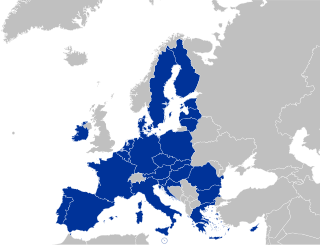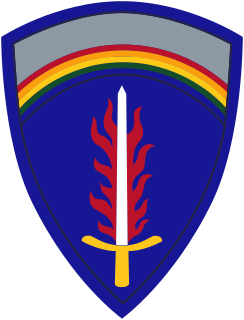
The Schengen Agreement is a treaty which led to the creation of Europe's Schengen Area, in which internal border checks have largely been abolished. It was signed on 14 June 1985, near the town of Schengen, Luxembourg, by five of the ten member states of the then European Economic Community. It proposed measures intended to gradually abolish border checks at the signatories' common borders, including reduced speed vehicle checks which allowed vehicles to cross borders without stopping, allowing residents in border areas freedom to cross borders away from fixed checkpoints, and the harmonisation of visa policies.

The European Corps (Eurocorps) is an intergovernmental military corps of approximately 1,000 soldiers stationed in Strasbourg, Alsace, France. The corps had its headquarters established in May 1992, activated in October 1993 and declared operational in 1995. The nucleus of the force is the Franco-German Brigade established in 1987. The Treaty of Strasbourg, signed in 2004, gave the corps its formal legal basis when it entered into force on 26 February 2009.

The European Gendarmerie Force is an operational, pre-organised, robust, and rapidly deployable, exclusively comprising elements of police forces with military status of the Parties, in order to perform all police tasks within the scope of crisis management operations. Art.1 of the Treaty establishing the European Gendarmerie Force.

The Common Security and Defence Policy (CSDP) is the European Union's (EU) course of action in the fields of defence and crisis management, and a main component of the EU's Common Foreign and Security Policy (CFSP).
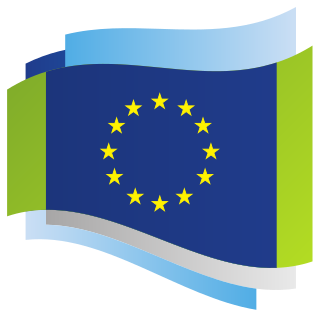
The European Defence Agency (EDA) is an agency of the European Union (EU) that promotes and facilitates integration between member states within the EU's Common Security and Defence Policy (CSDP). The EDA is headed by the High Representative (HR/VP), and reports to the Council. The EDA was established on 12 July 2004 and is based in Brussels, Belgium.

The visa policy of the Schengen Area is set by the European Union and applies to the Schengen Area and to other EU member states without opt-outs obtained by Ireland and the United Kingdom. The visa policy allows nationals of certain countries to enter the Schengen Area via air, land, or sea without a visa for stays of up to 90 days within a 180 day period. Nationals of certain other countries are required to have a visa either upon arrival or in transit.

In the European Union (EU), enhanced cooperation is a procedure where a minimum of nine EU member states are allowed to establish advanced integration or cooperation in an area within EU structures but without the other members being involved. As of October 2017 this procedure is being used in the fields of divorce law, patents, property regimes of international couples, and European Public Prosecutor and is approved for the field of a financial transaction tax.
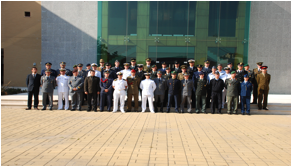
The Military Erasmus Programme, formally the European initiative for the exchange of young officers inspired by Erasmus, is an initiative undertaken by the European Union (EU) member states aimed at developing the exchanges between armed forces of future military officers as well as their teachers and instructors during their initial education and training. Due to the fact that the initiative is implemented by the Member States on a purely voluntary basis, their autonomy with regard to military training is not compromised.
The Schengen acquis is a set of rules and legislation, integrated into European Union law, which regulate the abolishment of border controls at the internal borders within the Schengen Area, as well as the strengthening of border controls at the external borders.
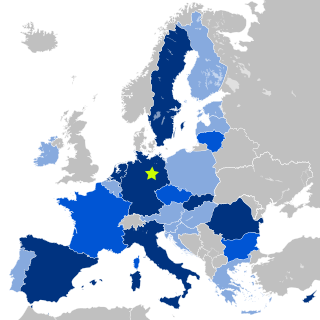
The European Medical Command (EMC) is a planned medical command centre in support of the military operations of the European Union, as part of the Permanent Structured Cooperation (PESCO).

The European Union Force Crisis Response Operation Core is a flagship European Union (EU) defence project under development as part of the Permanent Structured Cooperation (PESCO) facility. EURFOR CROC will contribute to the creation of a "full spectrum force package" to speed up provision of military forces and the EU's crisis management capabilities.

The Coordinated Annual Review on Defence (CARD) is a process of monitoring the defence plans of European Union (EU) member states to help coordinate spending and identify possible collaborative projects. It has operated on a test basis since 2017 under the European Defence Agency (EDA), in cooperation with the European External Action Service (EEAS). The first full implementation of CARD will be in the autumn of 2019.

The Military Planning and Conduct Capability (MPCC) is a permanent operational headquarters (OHQ) at the military strategic level for military operations of up to 2500 troops deployed as part of the Common Security and Defence Policy (CSDP) of the European Union (EU) by the end of 2020. Since its inception in 2017, the MPCC has commanded three non-executive training missions in Somalia, Mali and the Central African Republic.

The impact of Brexit on the European Union (EU) will result in social and economic changes to the Union, but also longer term political and institutional shifts. The extent of these effects remain somewhat speculative until the precise terms of the United Kingdom's post-Brexit relationship with the EU becomes clear. With the EU's policies on freedom of movement and the economic benefits and drawbacks which the UK and the EU provide each other with, there will be a clear impact with consequences for both institutions.

This article outlines the history of the Common Security and Defence Policy (CSDP) of the European Union (EU), a part of the Common Foreign and Security Policy (CFSP).
This articles outlines the defence forces of the European Union (EU), which implement the EU's Common Security and Defence Policy (CSDP) in CSDP missions. There are two categories of EU multinational forces: ones that have been established intergovernmentally and made available to the CSDP through article 42.3 of the Treaty on European Union (TEU), such as the Eurocorps; and the EU Battlegroups, established at the EU level.
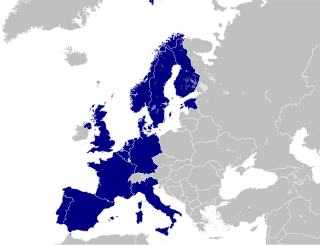
The European Intervention Initiative (E2I) is a joint military project between 10 European countries outside of existing structures, such as the North Atlantic Treaty Organization (NATO) and the European Union's (EU) defence arm. E2I is planned to operate a "light" permanent secretariat based on the network of military liaison officers with the French defence ministry.
The Joint European Union Intelligence School (JEIS) is a project of the Permanent Structured Cooperation (PESCO) that was announced in November 2018. The project will be led by Cyprus and Greece. The school will provide education and training in intelligence disciplines, among other things, to EU member states intelligence personnel, and develop new hardware, including drones and electronic warfare technology.



